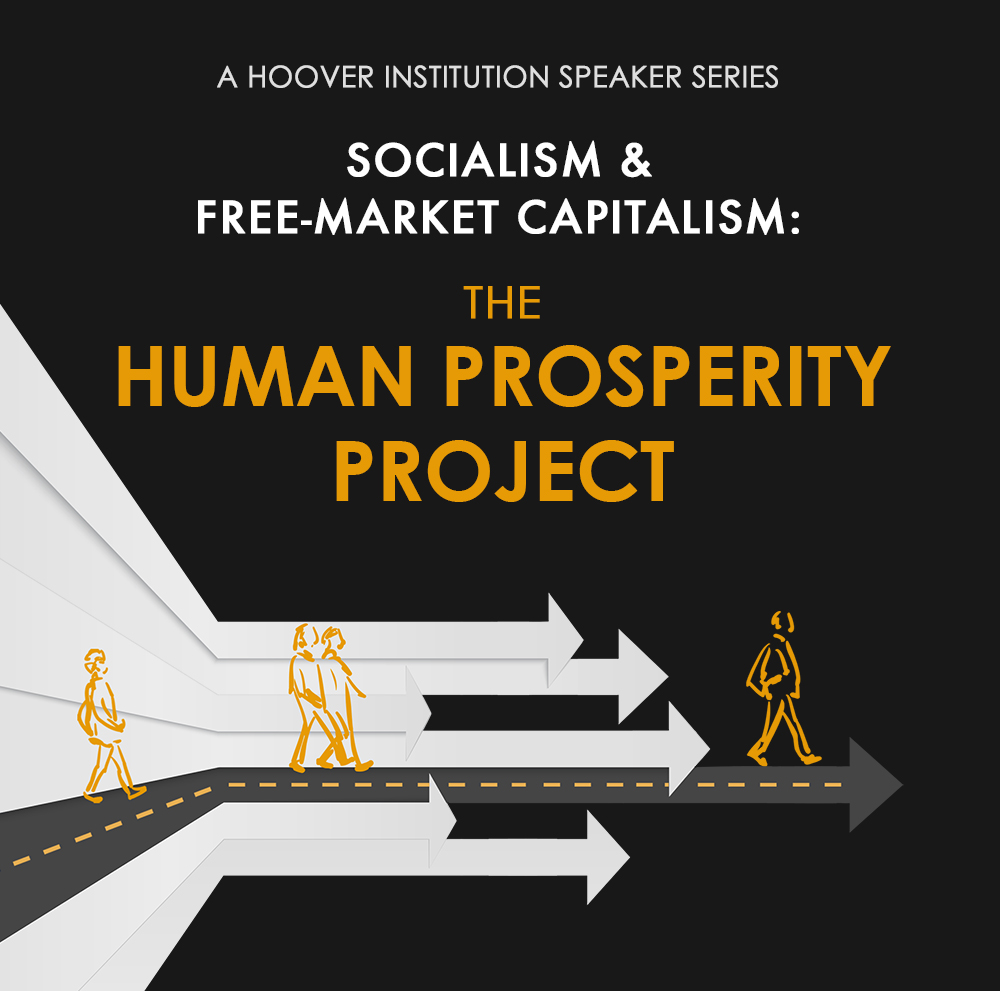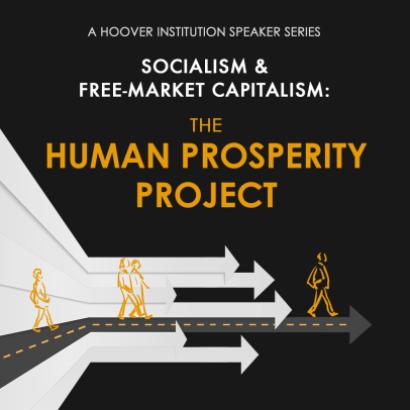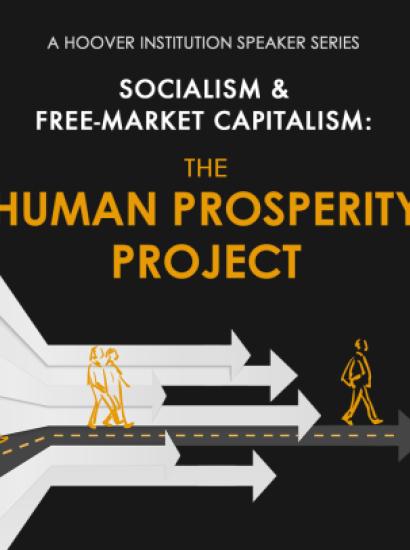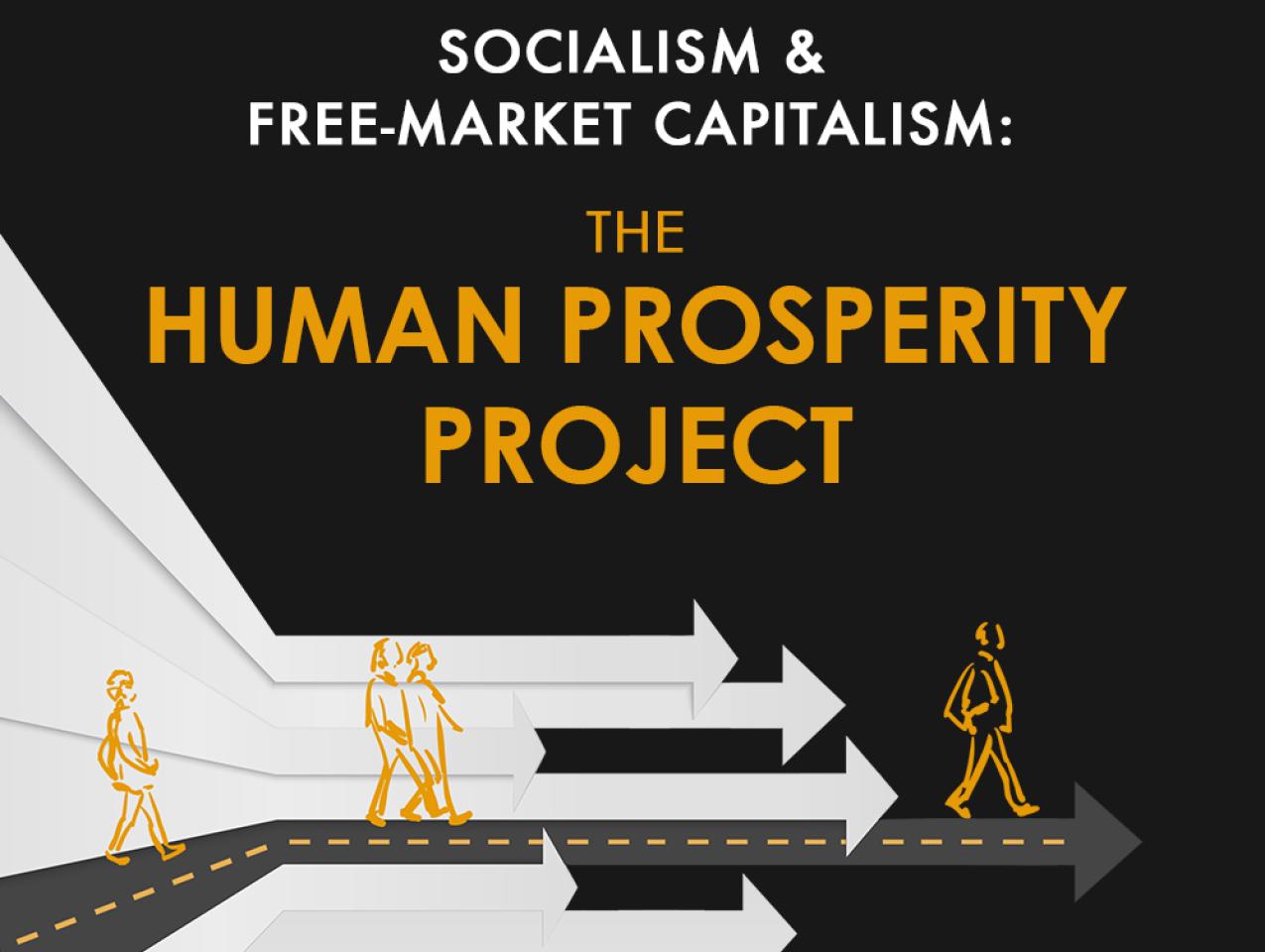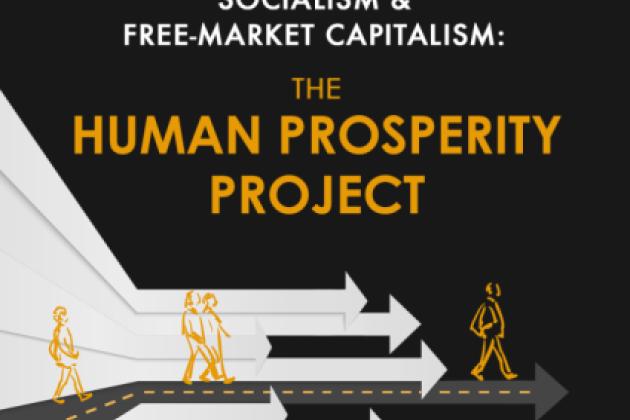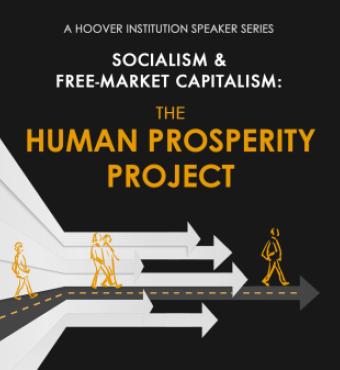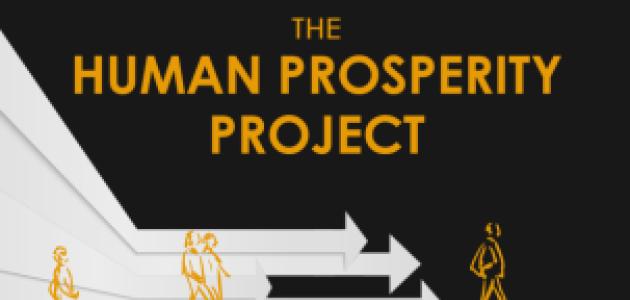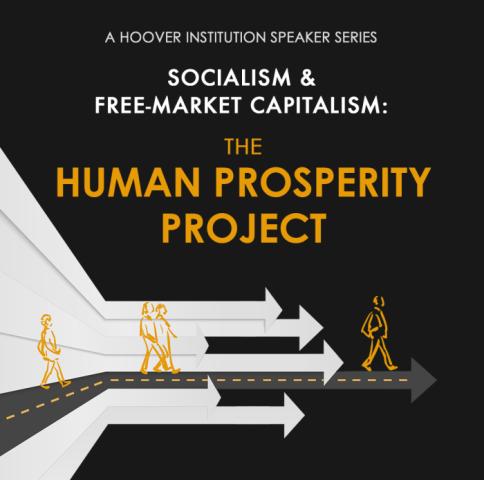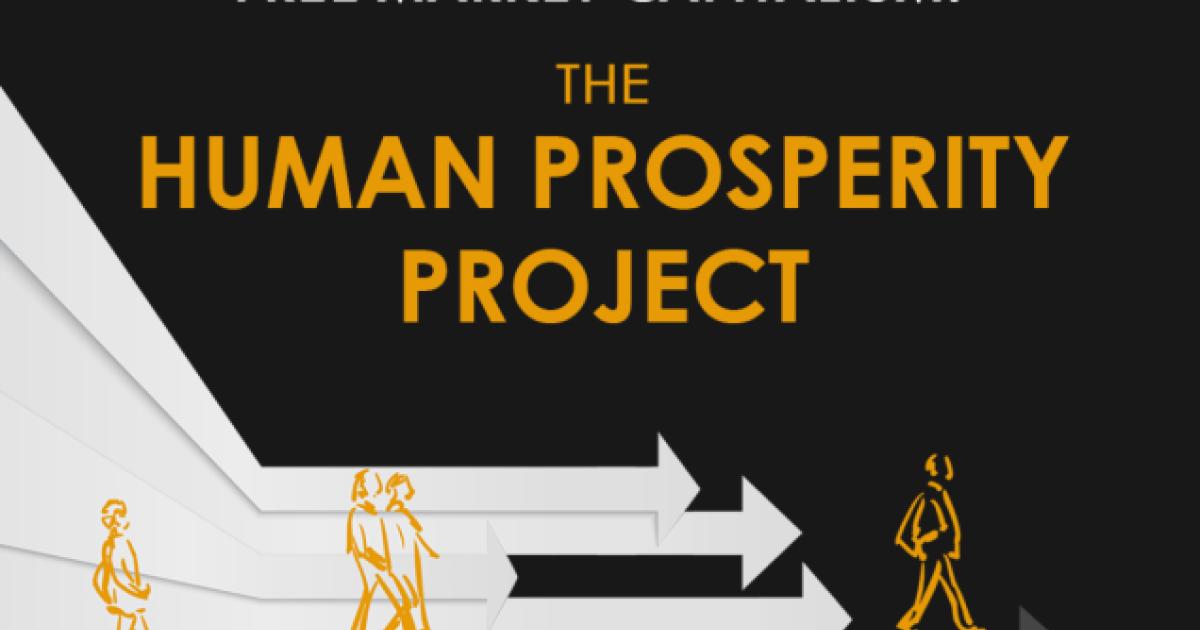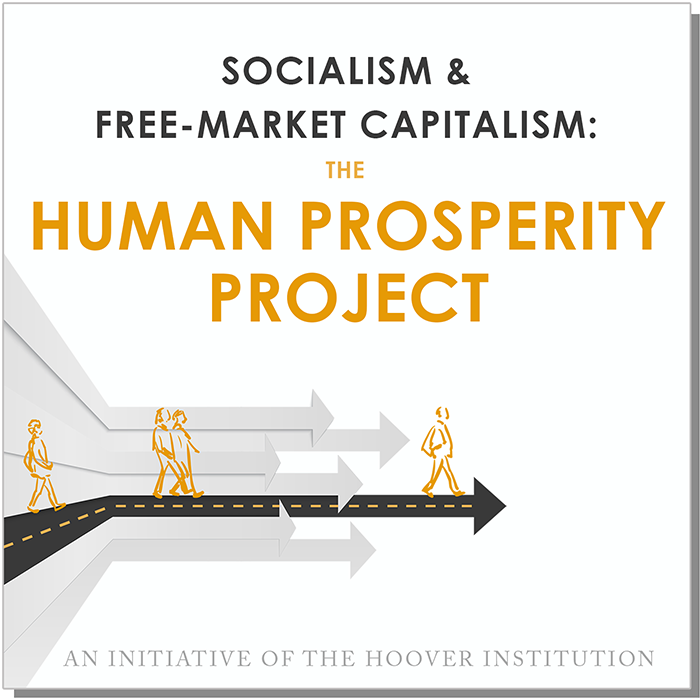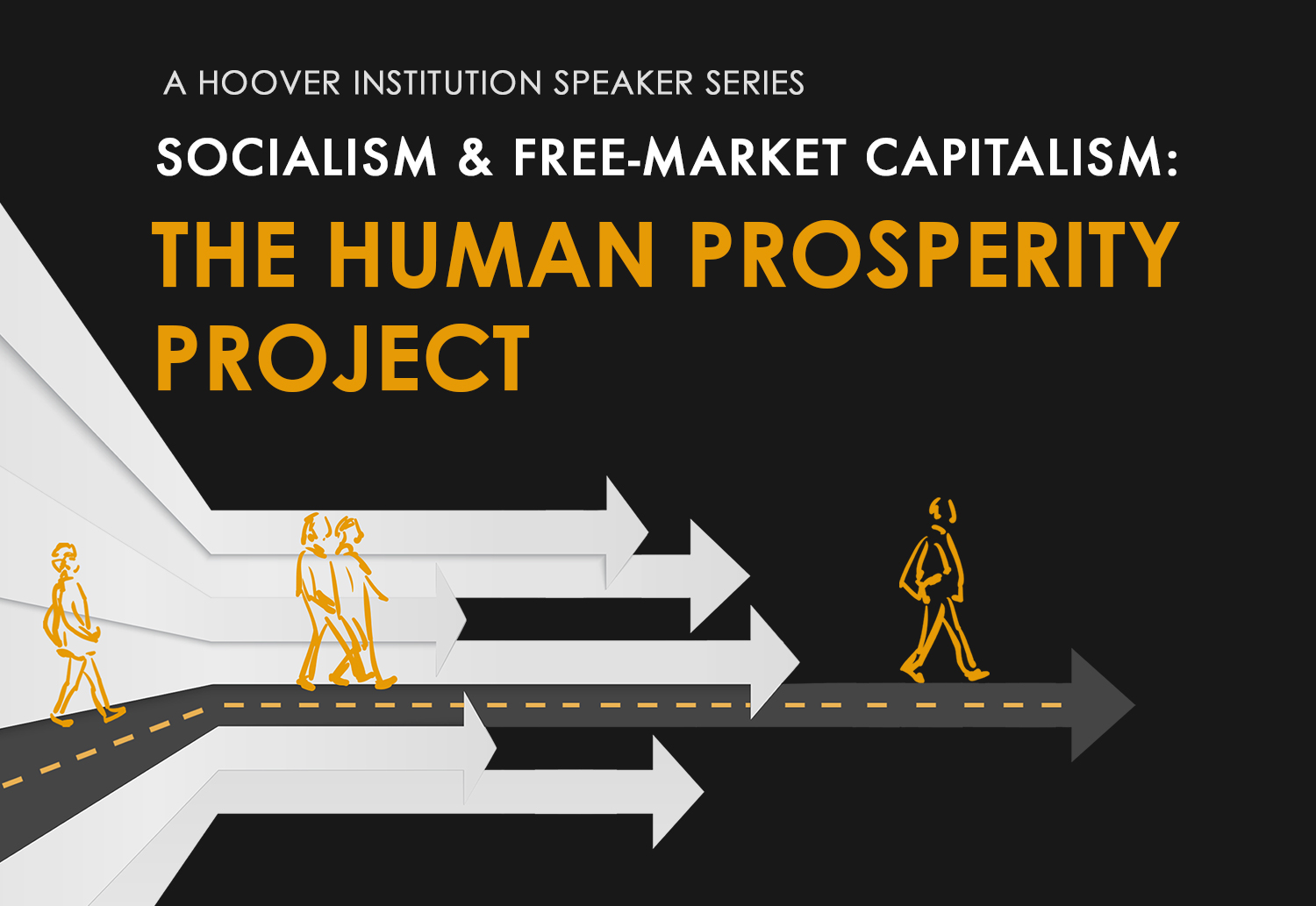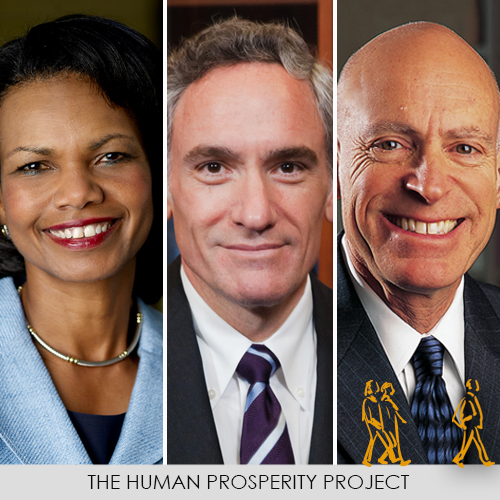
The Human Prosperity Project, a Hoover research initiative in which scholars survey empirical data regarding the historical record of socialism and free-market capitalism, has launched a new online speaker series featuring Hoover fellows’ commentary on the world’s most prominent and conflicting economic systems.
The series premiered on Monday, July 20, 2020, in an episode featuring Condoleezza Rice, the Thomas and Barbara Stephenson Senior Fellow and incoming Hoover Institution director. In conversation with the project’s cochairs, Scott Atlas, Robert Wesson Senior Fellow, and Edward P. Lazear, Morris Arnold and Nona Jean Cox Senior Fellow, Rice offered perspectives on Communist China, the allure of socialism among America’s youth, and her own experiences studying Soviet Russia.
Rice began the conversation by talking about how the topic informs her expertise in foreign policy. She noted that important lessons can be learned by studying the politics of the People’s Republic of China (PRC). She explained that US policy makers expected Beijing to liberalize its political system as it embraced markets and engaged in global trade. However, despite its deep diplomatic and commercial ties with the United States and other Western democracies, China has liberalized neither its government from totalitarianism nor its top-down command economy to allow for fair competition.
Rice said that China appeared to be on a path toward liberalization following the death of Mao Zedong. A series of leaders, beginning with Deng Xiaoping in the late 1970s and ending with Hu Jintao in the second decade of the twenty-first century, shared responsibility for governing with other Chinese Communist Party officials. However, since Xi Jinping assumed leadership of the PRC, he has ostensibly established “personal rule” by securing control of the country’s most important governmental entities.
Rice explained that some leaders in the West have become afflicted by what she referred to as “authoritarian envy”; that is, they are impressed by what China and other top-down governments can efficiently accomplish, whereas democracies can seem relatively stalled by multiparty rule and political gridlock.
“It is true that authoritarians can get things done, but when you have a single point of failure, they will also efficiently carry out bad policy,” Rice remarked.
She attributed China’s one-child policy as an example of a “single point of failure.” Originally designed to address concerns about overpopulation, the policy over the long term has led to an unbalanced ratio of males to females, resulting from a disproportionate number of abortions and infanticides committed on the latter.
“I will take the kind of messiness of democracy, where you will have a lot of checkpoints. Maybe you won’t get as much done, but you also won’t make really big mistakes,” Rice opined.
Rice also commented on how the Human Prosperity Project can inform consideration of racial injustice in the United States, recently underscored by the murder of George Floyd. She noted that while many young Americans may believe inequality can be solved by a Scandinavian brand of socialism, it is difficult to apply what might work in small and culturally homogenous countries like Denmark and Sweden to a nation as geographically and ethnically diverse as the United States.
Rice acknowledged that America is not without its flaws, and that there are fundamental problems of unfairness in the existing capitalist system. She stressed in place of working toward equality of outcome, leaders and citizens should strengthen the principle of equality of opportunity throughout America’s institutions in order to help calm tensions and forge progress toward racial equality.
Rice believes that ensuring access to quality education would expand economic opportunity and provide a shield against injustice, albeit an imperfect one. She explained how virtual learning inspired by necessities surrounding the COVID-19 pandemic has revealed significant disparities among students that need to be corrected.
“If you are a parent who is educated, you can help your child at home with that remote learning, Rice said. “If you are a poor kid, whose parents perhaps do not even speak the language, your learning loss is going to be so much greater.”
Rice was asked by one viewer if governments should command its citizens to work toward the common good when the private sector fails to provide certain necessities. She replied that the most effective solutions are not likely to come from the government and that private enterprise can fill certain voids and provide remedies to challenges when proper incentives are in place. Rice cited Tesla as an example of a company that has responded to society’s concerns about climate change by developing an automobile, increasingly adopted by consumers, that runs on electricity.
The former secretary of state concluded the conversation by reflecting on the evolution of her personal views about socialism and free-market capitalism. Rice recalled that during strolls in the streets of Moscow while studying the Russian language, she came to realize just how downtrodden citizens of the Soviet Union were.
“People looked at their feet when they walked along. They had no energy. They were beaten down. They were afraid to say anything,” Rice explained. “It wasn’t long for me before the idea [came] that the thing I most wanted my government to do was to protect my right to say what I thought, to be free from the knock of the secret police at night, to be free from the arbitrary power of the state, to worship as I pleased, and to have the right to be educated so that I could prosper.”
Join us for these upcoming conversations in the Human Prosperity Project Speaker Series:
Ayaan Hirsi Ali and Russell Roberts
Personal Freedom and the Moral Case for Capitalism
Thursday, July 23, 2020 | 11:00 am PT | 2:00 pm ET
Michael McConnell and John Yoo
Liberty and Federalism
Thursday, August 6, 2020 | 11:00 am PT | 2:00 pm ET
Edward P. Lazear and Lee Ohanian
Opportunity and Income Inequality
Thursday, August 20, 2020 | 11:00 am PT | 2:00 pm ET
Niall Ferguson and Victor Davis Hanson
Socialism and Capitalism: The Past and the Future
Thursday, September 3, 2020 | 11:00 am PT | 2:00 pm ET







